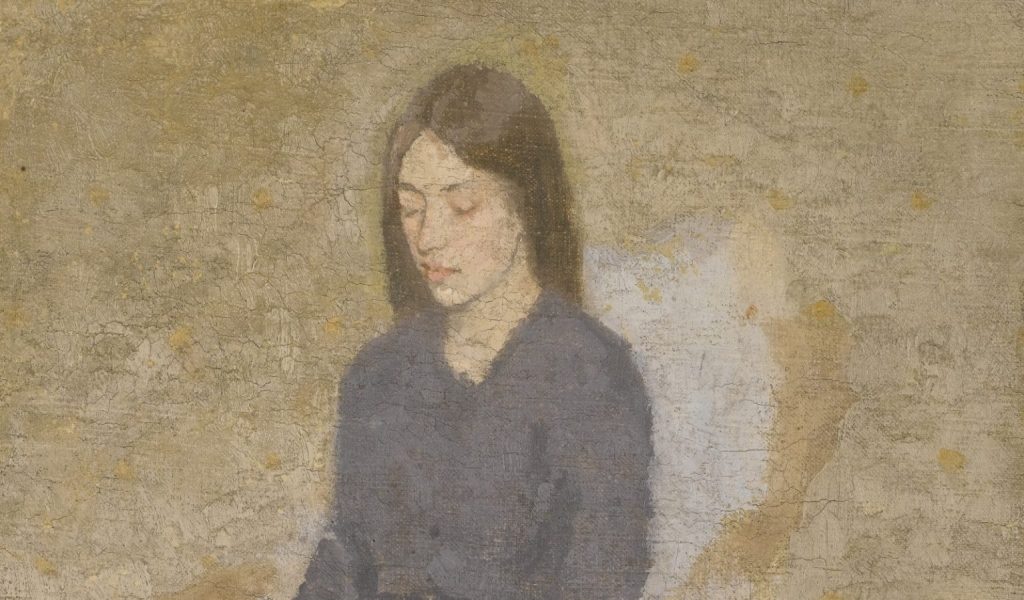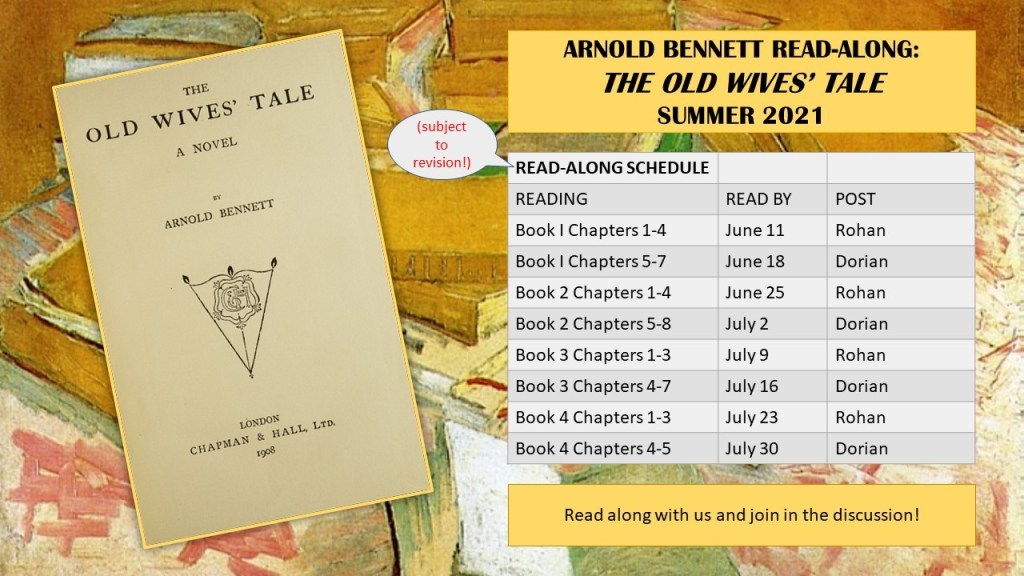I’ve long wanted to read something together with Rohan. (She was my professor, long ago–when she was very young, I might add–and so I have read a number of things at her behest, but that’s different…) We traded ideas and decided on Arnold Bennett’s The Old Wives’ Tale (1908). And I hope you will consider joining us!
As Rohan wrote in her post introducing the project, we chose Bennett because he bridges the periods we study and teach (Victorianism for her, modernism for me), and because we’re curious to actually read him, rather than about him. Although Bennett was popular with both critics and ordinary readers, his reputation, at least in literary studies, suffered a blow from which it’s yet to recover when Virginia Woolf wrote an essay savaging him (and his Edwardian confreres H. G. Wells and John Galsworthy) for writing books that failed to respond to the changes in life Woolf somewhat facetiously dates to December 1910. (To be fair to Woolf–and the essay’s fascinating, well worth reading, she was responding to a review Bennett wrote of her third novel, Jacob’s Room, which he spectacularly failed to get.)
I’ve heard it said that The Old Wives’ Tale is Bennett’s masterpiece. It’s certainly hefty: its story of two sisters from Staffordshire, one of whom stays tied to their father’s drapery shop and one of whom elopes to Paris, runs to 600 pages in my old Penguin edition. But we’ve spaced the reading out over six weeks and the chapters look manageable, so I hope you won’t be daunted!
Rohan’s even designed a schedule to keep us on track. As you can see, we’ll alternate posting, offering reflections, asking questions, and soliciting your ideas. We hope for lively comment sections, but you can also post at your own blog or newsletter, or share thoughts on Twitter (#OldWivesTale21). If you feel ambitious and want to write a guest post, I will be delighted to host it.
Drapery shop vs. Paris: one of these sounds better than the other. Yet I suspect Bennett will play with my expectations. How different will these destinies prove to be? This piece–admittedly, I’ve only skimmed it, to avoid spoilers–enticingly suggests the novel will be anything but staid. “No English novelist ever suggested more unspeakable things, and got away without being understood, than me in that book,” Bennett later claimed. I say, bring it on, Arnold! Who wants to join me to see if he does?


What a great idea. As soon as Rohan suggested this joint reading, I immediately downloaded the novel, started reading it, and just kept going all the way through. Eager to join you in the reading and discussion. Thank you!
Wow, fantastic, Daphna! I take it you enjoyed it?
I did, very much. And it is quite different from other novels of the period. I sense a very non-Victorian audacity in different aspects of it.
Enticing description!
How great – both that you enjoyed it enough to power through it like that and that you’ll be joining in our discussion! I think I am going to try to keep to our modest instalments, but I also kind of hope I’ll be strongly tempted to read further. 🙂
One of the joys of the internet- amongst its many frustrations- is to just stumble upon a high quality literature blog (yours) through a search for reviews on a novel, I don’t even remember which, and then through you, to find yet another one (Dorian’s). All this while sitting at my computer in Tel Aviv. What are the odds?
Wonderful! (As is Tel Aviv–have only visited once, but still remember the breakfasts longingly…)
Oh man, just as I’ve almost cleared my side table of very large books, you come along and tempt me with another one! Trying to resist, but it does sound interesting.
Also, it appears that Woolf and Hartley mutually disparaged one another as well, so maybe that’s another reason I should give Bennett a chance?
Oh, I’d be delighted if you joined, Nat!
It’s funny, I so think of Hartley as a 50s writer that I’m startled to think of Woolf knowing him, though of course he’d already been writing for decades.
I’ve managed to download an electronic copy (which is pretty much required for me at this point) so I will give it a try!
And yes, I’ve only recently realized that Hartley was sort of a “late bloomer” (first full-length novel at 49, The Go-Between at 58), although he’d been on the scene and writing shorter fiction and reviews in the ‘20s and ‘30s.
Great, glad to hear it! I think Rohan is reading it that way too.
Tempted, but I’m overcommitted as it is. I will read the essay though, I have a soft spot for The Forsyte Saga due to the mini series so I want to see what she says about Galsworthy. To me, The Forsyte Saga is about exactly the changes the world was going though (or the inability of older generations to change, anyway).
Okay I’ve only just started reading, and she starts out pitting two generations against each other – Edwardians and “Georgians” – you know I love generational discourse so this is right up my alley lol!
Been meaning to read Forsythe for a long time. She talks about the writers in general (their aims, etc) more than any individual works, so you won’t find too much about Galsworthy on his own.
I’ve only read this once and I did love it, but my summer is stuffed full and this year is general is slightly overbooked with an assortment of reading projects. Will share the details online though and am sure you’ll find lots of eager Bennett readers!
Understand. Thanks for spreading the word. I’m glad you enjoyed the book enough to even think about reading it again!
Pingback: A season in Middlemarch – the [blank] garden
Pingback: Nat Leach’s Year in Reading, 2021 | Eiger, Mönch & Jungfrau